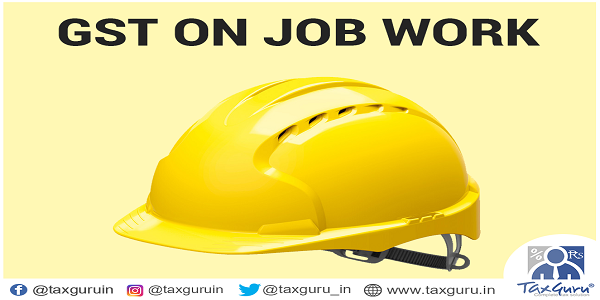Sandeep Goyal & Aanchal Goyal Advocates
‘Job work’ is a very significant part of our country’s industry and a much talked about subject among the tax fraternity. A lot of manufactures send the inputs or semi finished goods out for processing and treatment and receive back finished goods after paying labour charges to the job workers.
What is job work?
Under GST regime, Sec. 2(68) of CGST Act, 2017 deals with the definition of job work. It is defined in the Act as ‘any treatment or process undertaken by a person on goods belonging to another registered person and the expression job work shall be construed accordingly’. The person to whom the goods belong is the Principal.
Registration
As per section 143 of the CGST Act, 2017, while the principal has to be registered, job worker within the same state may or may not be registered. The Rules identify a threshold limit for registration for a jobworker receiving intrastate goods although it is compulsory for those receiving interstate goods. For all the job workers who are unregistered, the principal is liable to pay tax under reverse charge mechanism. Section 9(4) of the Act envisages that ‘The central tax in respect of the supply of taxable goods or services or both by a supplier, who is not registered, to a registered person shall be paid by such person on reverse charge basis as the recipient and all the provisions of this Act shall apply to such recipient as if he is the person liable for paying the tax in relation to the supply of such goods or services of both.’ Hence, many job workers would now prefer to get themselves registered as the principal would not want to pay tax under RCM method and also if it wishes to supply goods directly from the premises of job worker, registration for the latter is mandatory.
Input tax credit
Sec. 19 of the Act envisages a situation where the inputs are purchased by the principal and are directly sent to the job worker without bringing them first to its own premises. Section 16(2) of the Act makes it vivid that in such situation also, the ITC on inputs would be available to the principal.

A concept of Challans:
Rule 45 of CGST Rules declares that the condition to send inputs and capital goods to the job worker is that the goods are to be covered by a delivery Challan specifying the place where they are sent. The said Rule reads as ‘The inputs, semi finished goods or capital goods shall be sent to the job worker under the cover of Challan issued by the Principal, including where such goods are sent directly to a job worker and where the goods are sent from one job worker to another job worker, the Challan may be issued either by the principal or the job worker sending the goods to another job worker.’
This rule has been amended vide notification No. 14/2018-Central tax dated 23.03.2018 to provide that a job worker may endorse the Challan issued by the principal. It is now provided that the Challan issued by the principal may be endorsed by the job worker before sending it to another job worker. In case there is piece meal return of quantity by the job worker, it is obligatory that the job worker issues a fresh Challan each time. It is clearly mentioned in sub-rule 3 of Rule 45 that all the details of Challans shall be included in Form GST ITC-04 furnished for that period by the principal on or before the twenty fifth day of the month succeeding the said quarter. The outward supplies are recorded in GSTR-1, for that tax period.
E way BILL- prior to commencement of movement of goods
As per the provisions contained in rule 138 of the CGST Rules, an e-way bill is required to be generated by every registered person who causes movement of goods of consignment value exceeding fifty thousand rupees even in cases where such movement is for reasons other than for supply. Further, the third proviso to rule 138(1) of the CGST Rules provides that the e-way bill shall be generated either by the principal or by the registered job worker irrespective of the value of the consignment, where goods are sent by a principal located in one State/Union territory to a job worker located in any other State/ Union territory.
Return of goods
A bare reading of section 143 of the Act suggests that the goods sent have to be brought back by the principal within a period of one year after being sent out without any payment of tax failing with it shall be deemed to be a supply by the principal to the job worker on the day on which goods were sent out and accordingly tax and interest would be payable by the principal. Similarly, the capital goods sent by the principal have to be sent back within the period of 3 years, failing which said capital goods would be deemed as a supply by the principal to the job worker. However, capital goods like jigs, dies, fixtures or tools are excluded from the category of capital goods under the Act. Section 143 (2) lays down that It is the duty of the principal to keep a record of all the inputs and capital goods sent out.
There may be a situation when the principal instead of bringing back the finished goods from the job workers back to its premises chooses to supply the finished goods directly from the job worker’s premises. In such a scenario, it is imperative that the principal declares the job worker’s place as his additional place of business. Since the supply is being made by the principal, it is clarified that the time, value and place of supply would have to be determined in the hands of the principal irrespective of the location of the job worker’s place of business. Further, the invoice would have to be issued by the principal. It is also clarified that in case of exports directly from the job worker’s premises, the LUT or bond shall be executed by the principal. Illustration: The principal is located in State of Punjab, the job worker in State of Haryana and the recipient in State of Madhya Pradesh. In case the supply is made from the job worker’s place of business / premises, the invoice will be issued by the supplier (principal) located in State of Punjab to the recipient located in Madhya Pradesh. The said transaction will be an inter-State supply. Had the supplier and recipient been in Punjab and the job worker in Haryana, the said transaction would have been intra state. At its worst, if goods are not received back within the stipulated period of one year, the delivery Challan shall be deemed to be an invoice for the purpose of GST provisions.
Generation of scrap
Have you wondered how the scrap generated in the manufacturing process is dealt with? We are aware that there are umpteen type of processing or treatments whereby scrap is generated in following the process. The job worker is obliged to return the scrap to the principal. The principal may even supply it directly from the job worker’s premises. Section 143 clause 5 reads as ‘Notwithstanding anything contained in subsections (1) and (2) , any waste and scrap generated during the job work may be supplied by the job worker directly from his place of business on payment of tax, if such job worker is registered, or by the principal if the job worker is not registered.’ Sometimes it may be agreed upon that even the job worker may retain the scrap. In such an event, its value is adjusted in arriving at labour charges. The scrap value is to be added to the labour charges for the payment of GST on part of job worker.
Take a hypothetical proposition for comprehending the concept of job work and its various dimensions. Let us suppose a private company X is engaged in manufacturing of dairy products like Ghee, Butter, Cheese and its registered under GST in Haryana. Another company Y approaches X for conversion of milk to Mozzarella Cheese on job work basis. It is agreed that the input of milk will be supplied free of cost to X by Y. X shall process milk and handover the final product – Mozzarella cheese to y who would have its additional place of business at factory premises of X. In the process of job work “culture” shall be used by X, procured by itself on payment of GST in addition to packaging material for cheese. The two by -products generated after manufacturing cheese are ‘fat and whey’.
On reading this proposition it is evident and patently clear that the entire transaction is covered under the ambit of Section 2(68) of CGST Act, 2017, for the fact that the principal y supplies inputs to job worker X who shall process it. The ownership of inputs remains with Y. The principal is supplying its own material essentially although minor addition made by the job worker in adding culture is permissible. Had the job worker contributed its own material in a substantial way, the said activity would move out of the scope of job work and would constitute manufacturing. It is important that milk supplied for conversion is clearly identifiable and distinguishable at all times in the process of manufacturing and as such there would be no intermingling of either the raw material or the final product.
The job worker is fully entitled to ITC of the GST paid on culture and packaging material under section 16 and 17 of the Act. Since both these items are being used for the use in the course of or furtherance of business of job work which is also taxable, ITC can be availed.
The rate of GST applicable on the proposed activity of converting cheese from milk would be governed by the Notification issued by the Central Govt. bearing Notification No. 11/2017- central Tax ( Rate) dated 28/6/2017 as amended upto date. As per subentry (i) (f) of Entry 26 under the heading 9988, the rate of tax on the processing of all food and food products falling under Chapters 1 to 22 in the First Schedule to the customs Tariff Act, 1975 would be 2.5% CGST and 2.5% HGST. It is needless to mention here that milk falls under chapter 4 of customs Tariff Act, 1975 and therefore, fulfills the conditions of subentry (i) of Entry 26 of aforesaid Notification. The rate of tax on the process would hence be 5%.
As per Section 143 of the CGST Act, a job worker is obliged to return all the goods back to the principal within one year. Hence, the two products i.e. whey and fat are to be returned to the principal alongwith the finished goods -cheese. For this purpose a Challan would be issued to the job worker in favour of principal in form GST ITC-04 which is to be submitted by the principal. It is worth mentioning for our knowledge that the same goods can be sold by the principal to the job worker, if need be. Such transactions would be Principal to Principal basis.
Section 10 of the IGST Act, 2017, recognizes the sale where no movement of goods is involved and in such a situation place of supply would be the location of the goods at the time of delivery of goods to the recipient. Accordingly it can be concluded safely that if the principal chooses to supply the goods to the job worker it can be done without movement in the same premises and even without generation of e-way bill.
There are certain lacunas in the provision of job work under the GST Act that strike my mind. The Act bears very rigid provision regarding the return of capital goods and finished goods back to the principal failing which the entire transaction is treated as supply at the hands of the principal and becomes taxable. Where human agency is concerned, the unexpected is always expected. Therefore, there should be a mechanism to save the interest of either party at its primary stage. Moreover, there is no parameter to determine the limit of adding minor inputs by the job worker in the process so as to save it from being termed as manufacturing. There is no threshold which would decide whether the substances used by job worker on its own are substantial or minimal. Such ambiguities give rise to further problems.
Nevertheless, the law is dynamic and ever changing. Let us all hope that the taxation laws in the coming years are smoother and even.







Very educative and usefull